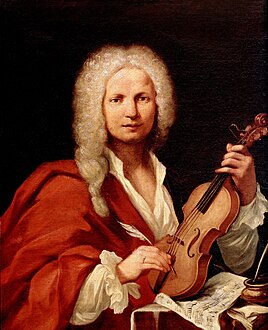
Antonio Lucio Vivaldi was an Italian Baroque composer, virtuoso violinist, teacher, impresario, and Roman Catholic priest. Born in Venice, the capital of the Venetian Republic, Vivaldi is regarded as one of the greatest Baroque composers, and his influence during his lifetime was widespread across Europe, being paramount in the development of Johann Sebastian Bach's instrumental music. He composed many instrumental concertos, for the violin and a variety of other musical instruments, as well as sacred choral works and more than forty operas. His best-known work is a series of violin concertos known as the Four Seasons.

Gioachino Antonio Rossini was an Italian composer who gained fame for his 39 operas, although he also wrote many songs, some chamber music and piano pieces, and some sacred music. He set new standards for both comic and serious opera before retiring from large-scale composition while still in his thirties, at the height of his popularity.

Tomaso Giovanni Albinoni was an Italian Baroque composer. His output includes operas, concertos, sonatas for one to six instruments, sinfonias, and solo cantatas. While famous in his day as an opera composer, he is known today for his instrumental music, especially his concertos. He is also remembered today for a work called "Adagio in G minor", attributed to him but said to be written by Remo Giazotto, a modern musicologist and composer, who was a cataloger of the works of Albinoni.
Mefistofele is an opera in a prologue and five acts, later reduced to four acts and an epilogue, the only completed opera with music by the Italian composer-librettist Arrigo Boito. The opera was given its premiere on 5 March 1868 at La Scala, Milan, under the baton of the composer, despite his lack of experience and skill as a conductor.
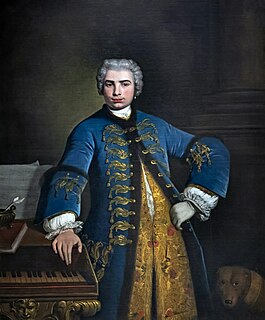
Farinelli was the stage name of Carlo Maria Michelangelo Nicola Broschi, a celebrated Italian castrato singer of the 18th century and one of the greatest singers in the history of opera. Farinelli has been described as having soprano vocal range and sang the highest note customary at the time, C6.

Giovanni Bononcini was an Italian Baroque composer, cellist, singer and teacher, one of a family of string players and composers.
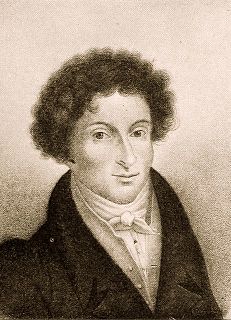
Francesco Giuseppe Baldassare Morlacchi was an Italian composer of more than twenty operas. During the many years he spent as the royal Royal Kapellmeister in Dresden, he was instrumental in popularizing the Italian style of opera.

Giuseppe Gazzaniga was a member of the Neapolitan school of opera composers. He composed fifty-one operas and is considered to be one of the last Italian opera buffa composers.
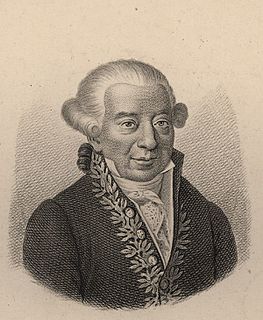
Leopoldo Marco Antonio Caldani (1725–1813) was an Italian anatomist and physiologist.
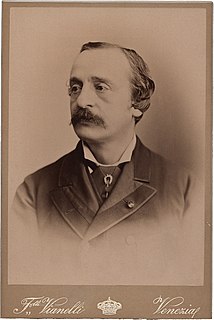
Ciro Pinsuti was an Anglo-Italian composer. Educated in music for a career as a pianist, he studied composition under Rossini. From 1848 he made his home in England, where he became a teacher of singing, and in 1856 he was made a professor at the Academy of Music in London.
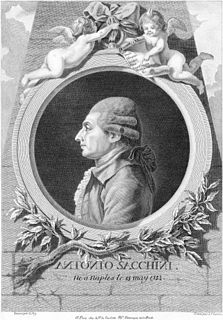
Antonio Maria Gasparo Gioacchino Sacchini was an Italian composer, best known for his operas.
Joseph Kaschmann, known also as Giuseppe Kaschmann and Josip Kašman, was a noted Austrian operatic baritone of partial Croatian descent. He sang in Europe and America during the latter decades of the 19th century and the early years of the 20th century.
Petronio Franceschini was a Baroque composer from Italy.
Matteo Antonio Babini, also known by the family name of Babbini, was a leading Italian tenor of the late 18th-century, and a teacher of singing and stage art.
Gennaro Astarita was an Italian composer, mainly of operas. The place of his birth is unknown, although he was active in Naples for many years. He began his operatic career in 1765, collaborating with Niccolò Piccinni in the writing of the opera L'orfana insidiata. He became the maestro di cappella in Naples in 1770.
Giovanni Tadolini was an Italian composer, conductor and singing instructor, who enjoyed a career that alternated between Bologna and Paris. Tadolini is probably best known for completing six sections of Rossini's 1833 version of the Stabat mater after the latter fell sick. However, he also composed eight operas as well as sinfonias, sonatas, chamber music, and numerous pieces of religious music and art songs.

Annibale Pio Fabri, also known as Balino, from Annibalino, diminutive of his first name, was an Italian composer and singer of the 18th century. One of the leading tenors of his age in a time dominated by the castrati, Fabri is now best known for his association with the composer George Frideric Handel, in whose operas Fabri sang.

Elisabetta Manfredini-Guarmani was an Italian opera singer best known for having created the leading soprano roles in four of Rossini's operas, roles which he wrote specifically for her voice. She was born Antonia Elisabetta Manfredini in Bologna and was the daughter of the composer and music theorist Vincenzo Manfredini. After her stage debut in 1810 when she sang in the premiere of Stefano Pavesi's Il trionfo di Gedeone at Bologna's Teatro del Corso, she went on to perform at La Fenice, La Scala, Teatro Regio di Torino, Rome's Teatro Argentina and several other opera houses, primarily in Northern Italy. In addition to the roles she created in Rossini's operas, she also sang in the world premieres of operas by several composers who are lesser known today, including Pietro Raimondi, Simon Mayr, and Ferdinando Paër. Her last known appearance was in 1828 after which there is no further trace of her. The date and place of her death are unknown.
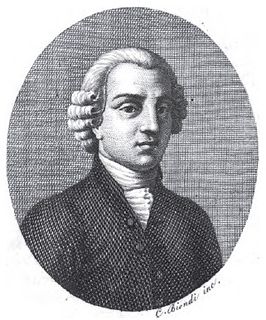
Sebastiano Biancardi, known by the pseudonym Domenico Lalli, was an Italian poet and librettist. Amongst the many libretti he produced, largely for the opera houses of Venice, were those for Vivaldi's Ottone in villa and Alessandro Scarlatti's Tigrane. A member of the Accademia degli Arcadi, he also wrote under his arcadian name "Ortanio". Lalli was born and raised in Naples as the adopted son of Fulvio Caracciolo but fled the city after being implicated in a bank fraud. After two years wandering about Italy in the company of Emanuele d'Astorga, he settled in Venice in 1710 and worked as the "house poet" of the Grimani family's theatres for the rest of his career. In addition to his stage works, Lalli published several volumes of poetry and a collection of biographies of the kings of Naples. He died in Venice at the age of 62.

Siroe re di Persia is a libretto in three acts by Pietro Metastasio. Set to music by Leonardo Vinci, it was first performed on 2 February 1726 at the Teatro San Giovanni Grisostomo, Venice. It was subsequently set to music at least 35 times by different composers.














